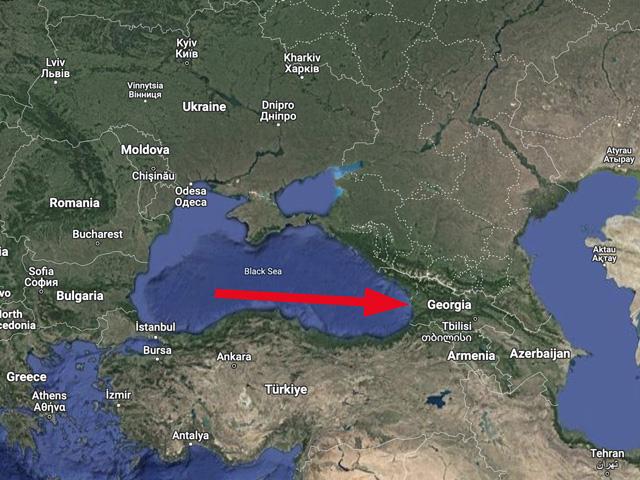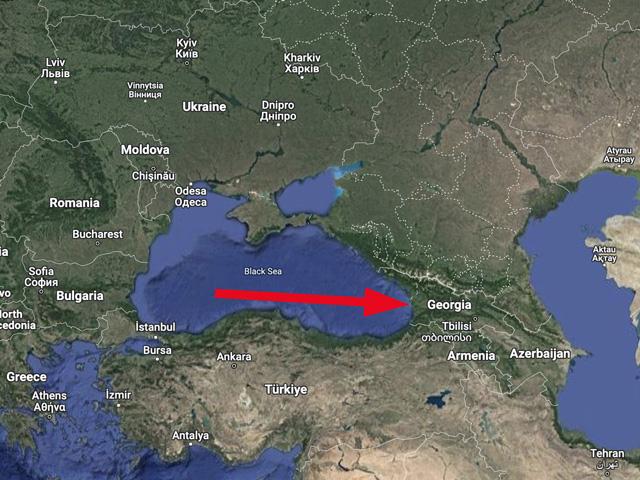An Urban's Rural View
A Postcard From Wine's Birthplace
I'm writing this post in Georgia -- not the state known for peaches but the country known for wine and wine grapes.
This Georgia is nestled in the Caucasus mountains with the Black Sea to its west, Russia to the north, Turkey and Armenia to the south and Azerbaijan to the east and southeast. The country has about half the area of the U.S. state and its population of 3.7 million is well less than half the state's.
Georgians call their country Sakartvelo. Georgia is the English name. The dragon-slayer St. George is the country's national symbol. (The American state was named after King George II of England, who signed the then-colony's charter in 1732.)
As for the grapes, Georgia is where wine making originated, back in the eighth century BC, archaeological evidence indicates. (https://www.nationalgeographic.com/…). It's "the cradle of viticulture." Recent DNA research suggests grapes may have been the first wild plant to be domesticated, also in Georgia. https://www.washingtonpost.com/…
Wine making is still a big industry here. Production and exports have been growing. Russia is still the biggest export market -- during the Soviet era it was said that the best food and wine in Moscow were Georgian. But Georgian wine has been finding new markets, including the U.S., and Georgian wines have become trendy in some places.
Georgia has 400 grape varieties, a tenth of which are actively used in wine making today. As part of the "birds, wine and culture" tour I'm taking our group has sampled several of these and toured one of the country's biggest wineries.
P[L1] D[0x0] M[300x250] OOP[F] ADUNIT[] T[]
Dry reds based on the Saperavi grape were among our favorites. One night we sipped a slightly sweet Saperavi wine called Velvet Scoter, the profits from which go to support research on the bird of the same name.
Wine isn't the only thing Georgia is known for. In ancient times it was famous for gold and fine metalworking. In Greek mythology the ancient Georgian kingdom Colchis is where Jason pursued the Golden Fleece.
These days Georgia makes headlines for its fraught relationship with its neighbor to the north.
Fraught and complex. Anti-Russian sentiment is widespread among Georgians but the ruling party is the plaything of a billionaire who made his fortune in Russia. The gap between ruler and ruled was evident recently when the party tried to push through a repressive "agents of influence" law similar to Russia's. Mass protests ensued and the legislation was withdrawn.
As a small country with a strategic location at the crossroads between Europe and Asia, Georgia has a long history of being subjugated by imperial powers. In the distant past it was the Persians and the Ottomans. Over the last couple of centuries, the Russians have filled that role.
Georgia was swallowed up by Russia in the nineteenth century. It became independent in 1918 but in 1921 the Soviets invaded and Georgia became a Soviet republic. Soviet dictator Josef Stalin and his spy chief Lavrenti Beria were both ethnic Georgians.
When the Soviet Union was breaking up in the early 1990s Georgia was one of the first republics to claim its independence. Russia invaded Georgia during a brief, bloody war in 2008 and has given military support and diplomatic recognition to two breakaway Georgian provinces, Abkhazia and South Ossetia; only a handful of other countries have joined Russia in recognizing them.
Since Russia invaded Ukraine, draft-dodging Russians have flooded into Georgia, much to many Georgians' dismay. There's a lot of sympathy for Ukraine here. More than once we observed a blue and yellow version of Georgia's red and white flag, blue and yellow being the Ukrainian flag's colors.
Anti-Russian graffiti is easy to find on city walls. Demonstrations against the ruling party's coziness with Russia continue.
The country's fractious political situation has in no way interfered with our enjoyment of it as tourists. The Georgia we are experiencing is a land of warm, welcoming people, eye-candy scenery and an intriguing history and culture. We toured several monasteries with ancient icons and frescoes and observed a service at a famous Orthodox cathedral. (More than 80% of the people here are Georgian Orthodox Christians.)
The wine and the food alone were worth the trip. We have enjoyed almost everything we tried but khachapuri -- breads stuffed with cheese -- have been a particular favorite. Less than a fifth of this mountainous country is arable, but its agriculture is bounteous.
Though Georgia is off the beaten path for Americans, it's well worth a visit.
Urban Lehner can be reached at urbanize@gmail.com
(c) Copyright 2023 DTN, LLC. All rights reserved.






Comments
To comment, please Log In or Join our Community .